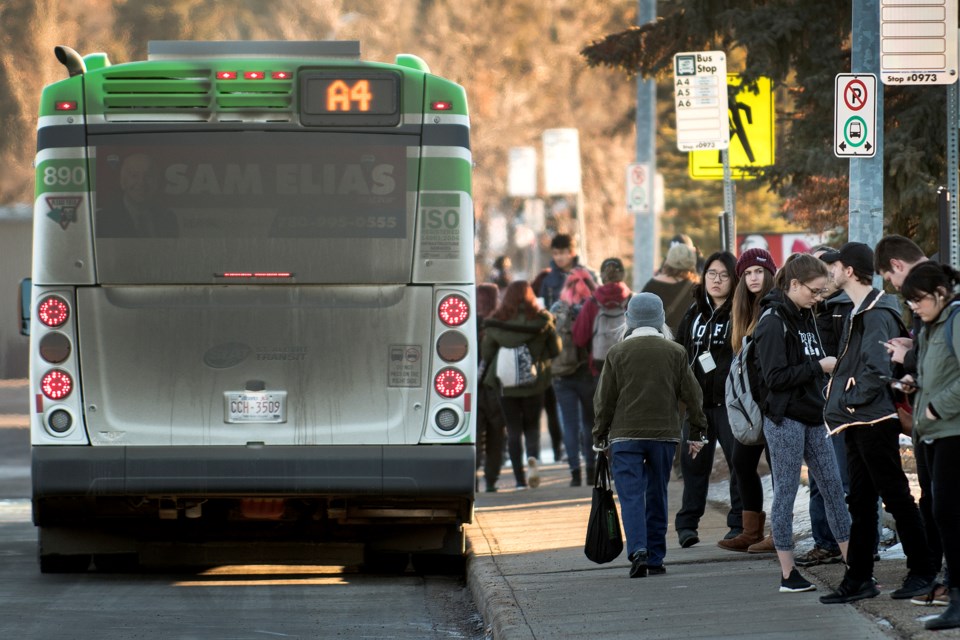The City of St. Albert will wait until budget deliberations this fall to decide when the city’s transit system will return to relatively normal operations.
Last Monday, council voted to defer a decision on transit service hours until the city's budget is presented on Nov. 2.
The recommendation to wait on a decision until the city’s budget is presented came from the city’s community growth and infrastructure committee earlier this month.
St. Albert Transit is expecting to see more people take the bus through the first eight months of 2021 with a return to full service in September of next year, assuming post-secondary students will be allowed to return back to campus.
"We can adjust service hours as required pending the rate of incremental growth," said Anthony Lake, director of public works and transit, during the committee meeting.
City buses have been operating on reduced hours since April after council decided to cut back services by about 100 hours a week amid the COVID-19 pandemic, saving the city about $45,000 per week.
Rather than buses passing stops every 15 minutes during peak hours, they come every 30 minutes. During midday periods, buses run once every hour.
More people are taking the bus than originally expected, according to the city. Ridership to the end of August is up slightly from the original forecast of 15 per cent of pre-COVID-19 levels and currently sits at approximately 20 per cent.
At the community growth and infrastructure standing committee meeting on Oct. 13, St. Albert Transit announced it was planning a modest three-hour increase starting Oct. 25. As of that date, transit service will be operating 295 weekday service hours.
Keeping weekday service hours at that level from Jan. 1 to Aug. 28 next year would cost the city about $6.1 million, offset by a potential $5-million federal subsidy. Projected ridership is expected to bring in $1.1 million in revenues during that time.
"We'll be operating the same amount of weekday hours between January 2021 and the end of August 2021 as we are currently operating as of October 25 of this year," said Ettore Iannacito, transit service delivery manager.
Another 24-per-cent increase to 372 hours per day would cost another $3.8 million through Aug. 29 to Dec. 31, potentially offset by a $2.4-million federal subsidy. During those last three months, revenues are expected to increase to $1.4 million.
The 372 hours for the last three months of the year is slightly less than the city's normal 400-hour schedule, but it's something administration believes they can work with, Lake said, along with the revised routes for the new Nakî Centre and whether or not students return to on-campus learning.
"Each time we add a bus, it's another $80,000 a month. We've tried to reflect something that considers our current ridership with what we perceive to be the incremental growth and stay within the confines of our fiscal reality," Lake said.
This scenario would cost the city about $9.9 million annually. Instead of returning to normal service levels right away next year, doing this gradual increase instead would save the city approximately $2.2 million.
On Aug. 30, the new Nakî Centre opened as the city’s primary transit centre. Council approved several route revisions back in January so that all routes originally stemming from the Village Landing station would be housed at the Nakî station.
Since then, the city has received several concerns from residents, Iannacito said.
"We expect that moving in such a large scale from one transit centre to another transit centre, that those folks that enjoyed being so close would potentially complain about the move," Iannacito said.
"It is anticipated that St. Albert Transit can resolve a majority of customer concerns with only slight adjustments."
As the weather gets colder, Coun. Wes Brodhead asked at the committee meeting if the Nakî station building was open with heating yet.
While the terminal itself is open, Lake said the building doesn't have power yet as the city hasn't taken possession of it. But the six bus shelters at the terminal should provide some kind of buffer against the cold wind, he said.
"At this point, we're anticipating not being able to take over the building until the end of October," Lake said.




